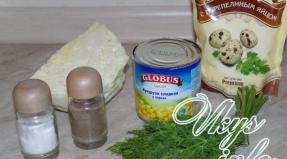Low-fat natural yogurt and kefir. What is the difference between yogurt and kefir? Differences between yoghurts and kefirs
KEFIR OR YOGHURT?
Many people believe that since yogurt and kefir are fermented milk products, there is not much difference between them. This is not true. The differences between yogurt and kefir range from differences in manufacturing and the types of bacteria present in them, to different effects on human health.
Differences between kefir and yogurt when cooking
There are two types of yoghurt: mesophilic and thermophilic.
Mesophilic yogurt means that it is cultured at room temperature.
Thermophilic yogurt during manufacture requires a certain temperature range for the incubation of bacteria. A special yoghurt maker Dnepropetrovsk will help you make thermophilic yoghurt at home. In it, during the preparation of yoghurt, a certain temperature is maintained, which contributes to the correct preparation process.
Kefir is a mesophilic culture, manufactured at room temperature.
There is also a difference in what is used to make a new batch of a product.
New batch yoghurt is prepared by adding a small amount of yoghurt from the previous batch to fresh milk. You can also make yogurt from dry sourdough.
Kefir is produced with the help of milk fungus (kefir grains). The number of gelatinous grains of this mushroom will increase with each new batch of kefir. When the kefir is ready, these grains are simply removed from the new batch and added to fresh milk to make the next batch. Kefir grains can also be purchased in the form of dry sourdough.
Which contains more bacteria - Yogurt or Kefir?
Yogurt and kefir differ in the types of bacteria they contain. And the drinks themselves differ in their effect on the body, they perform different tasks.
Yogurt contains two types of bacteria: Bulgaricus Lactobacillus and Streptococcus termophilus.
Kefir contains dozens of different types of lactic acid bacteria:
Lactobacillus acidophilus
- Lactobacilli brevis
- Lactobacilli casei
- Lactobacilli casei subsp. Rhamnosus
- Lactobacilli casei subsp. pseudo-plantarum
- Lactobacilli paracasei subsp. Paracasei
- Lactobacilli cellobiosus
- Lactobacilli delbrueckii subsp. Bulgaricus
- Lactobacilli delbrueckii subsp. Lactis
- Lactobacilli hilgardii
- Lactobacilli johnsonii
- Lactobacilli kefiri
- Lactobacilli kefiranofaciens
- Lactobacilli kefirgranum
- Lactobacilli parakefir
- Lactobacilli lactis
- Lactobacilli plantarum
- Bifidobatteri
- Lactococci lactis subsp. Lactis
- Lactococci lactis var. diacetylactis
- Lactococci lactis subsp. Cremoris
- Streptococci salivarius subsp. Thermophilus
- Streptococci lactis
- Leuconostoc cremoris
- Lieviti
- Acetobacter aceti
- Acetobacter rasene
Bacteria in yogurt helps the digestive tract to cleanse, yogurt is easy to digest and is food for the bacteria that inhabit a healthy intestine.
The bacteria pass through the gastrointestinal tract without lingering there.
Bacteria in kefir on the contrary, they can settle in the intestine, colonize it.
Kefir also contains, in addition to a large number of beneficial bacteria, yeast, which is beneficial to the body. But yeast produces a small amount of alcohol, so kefir contains up to about 0.07% alcohol.
What is tastier than yogurt or kefir?
Yogurt has a tart creamy taste and smooth texture.
Kefir also has a tart taste, but may still have a barely noticeable aftertaste of yeast and alcohol.
We all know that yogurt is eaten with spoons, and kefir can be drunk even through a straw. Yogurt has a thicker consistency than kefir, with the same fermentation time.
OUTPUT... Yogurt and kefir are healthy fermented milk products that perform different, different from each other, useful tasks in the body. π
Everyone has heard about the benefits of fermented milk products, and in Russia, for a long time, kefir has been considered the leader in this area: more than one generation has grown up on it. Yoghurt is an overseas guest, which at first was perceived exclusively as a delicious dessert, over time it began to be positioned as an alternative to kefir. There is no single answer to the question of which is healthier - kefir or yogurt.
What is the difference between kefir and yogurt? Just a variety of microorganisms that are used to ferment milk. Yogurt is obtained by adding a protosymbiotic mixture of two pure cultures to milk - the so-called Bulgarian bacillus and thermophilic streptococcus. The mixture of microorganisms necessary to obtain kefir is more extensive: these are streptococci, and lactic acid sticks, and acetic acid bacteria, and yeast. And one more nuance: kefir can be made from both skimmed and whole milk, and yogurt is prepared mainly from skimmed raw materials. A kind of kefir fungus is.
What is healthier than kefir or yogurt?
Both the one and the other product have a beneficial effect on the work of the digestive system and, being included in various diets, help to quickly and effectively get rid of extra pounds. But, taking into account the fact that real live yogurt is a great rarity, and sterilized and flavored ersatz are sold in stores, plain kefir is still healthier.
Actually, live yoghurt, the merits of which are so much talked about and written about, is nothing more than biokefir. It is then given its "presentation" with the help of thickeners such as starch, synthetic enhancers of taste and smell, dyes and preservatives. In theory, any high-quality "live" fermented milk product should not be stored in a refrigerator for more than one week. The same applies, for example, to the benefits and harms of which lead nutritionists to endless discussions. If the shelf life is extended to almost a month, then you can be sure: the substance in a beautiful plastic jar has nothing to do with natural yogurt. By the way, in Bulgaria, which is known as the birthplace of yogurt, the quality criteria for this lactic acid product are quite strict: sugar, thickeners, milk powder and other excesses are completely excluded from the recipe. But Russian yogurt producers use these components all the time.
So, what benefits will natural kefir bring to the body?
- It is one of the best products for immunity, as it stimulates the intestinal microflora - in the language of medical professionals, this is called "has a probiotic effect." Improvement of metabolism is inextricably linked with such processes.
- Regular use of kefir at night, according to many doctors, improves immunity. From the same point of view, the benefits of acidophilus, another effective fermented milk product produced on a fungal basis, are usually assessed.
- There is a slight sedative effect of kefir.
- Has a barely expressed diuretic effect.
- Lactose, a valuable carbohydrate from the group of disaccharides, found in milk and dairy products, is best absorbed from kefir.
To answer this question, you first need to understand what is yogurt and what is kefir. Many people will answer very simply - kefir is unsweetened, and yogurt is sweet. Yogurt contains all sorts of flavoring additives, but kefir does not. But all these answers can be considered too naive and little answer to the main question.
To begin with, let's deal with the yogurt, beloved by many. Yogurt is a fermented milk product with a high content of fat-free milk substances, made by fermenting Bulgarian bacillus and thermophilic streptococcus with a protosymbiotic mixture of pure cultures, the content of which in the finished product at the end of the shelf life is at least 10 to 7 CFU (colony-forming units) in 1 g of the product ... The addition of food additives, fruits, vegetables and products of their processing is allowed.
However, in Bulgaria, the homeland of yoghurt, real yoghurt cannot contain sugar, any additives or fruit fillers. Violators of the manufacture of this product are imprisoned for quite a long time.
Now a few words about kefir. In order to make yogurt, you need only 2 types of beneficial microorganisms. But in order to cook kefir - 20. And all these bacteria find a common language with each other. In addition, kefir contains a certain amount of ethyl alcohol, but in terms of protein content, kefir is inferior to yogurt, but not at all by much.
That's all the difference between these two products. Of course, there are not so many of them, but still they are worth knowing about them. But despite the differences, kefir and yogurt are incredibly healthy.
Kefir, like other fermented milk products, has a probiotic effect, that is, it has a beneficial effect on the intestinal microflora and metabolism in general. Due to its complex composition, kefir can inhibit the development of pathogenic flora in the intestine. Its medicinal properties are based on the bactericidal activity of lactic acid microorganisms and the results of their vital activity in relation to causative agents of some gastrointestinal diseases and tuberculosis. In addition, kefir has an immunostimulating, soothing and mild diuretic effect.
Kefir is more suitable than other dairy products for those who are lactose intolerant: it helps the absorption of lactose by acting as a catalyst.
Each lactic acid product has its own complex of probiotic effects, and it is kefir that may not be suitable for all people. Some doctors recommend other fermented milk products. There are also alternative sources of probiotics, such as lactobacilli and other beneficial microorganisms in sauerkraut.
Yogurt is a valuable source of calcium. Two cups of yogurt contains 450 mg of calcium. This is half the RDA for a child and about 30-40% of the RDA for an adult. Since the presence of live bacterial cultures improves the absorption of calcium, it follows that, when choosing between yogurt and milk, preference should be given to the former.
Yogurt is a great source of protein. Natural yogurt contains 10-14 grams of protein (two cups), which is 20% of the RDA for anyone. And again, yogurt containing live bacterial cultures gives the body more proteins than milk (10 g and 8 g, respectively). During the fermentation process in the manufacture of yoghurt, milk protein is converted, and the body absorbs it much more easily.
Fermented milk products are affordable, tasty, nutritious and easily digestible food. It is also very diverse and very useful.
Fermented milk products are especially useful for those who are trying to bring weight back to normal. Unloading diets on kefir or yogurt are considered one of the most effective and safe ways to fight overweight.
These fermented milk products are designed to normalize metabolism, improve digestion and intestinal function, strengthen immunity, and remove toxic substances from the body.
And what is the difference between yogurt and kefir? Which product is healthier?
Similarities between kefir and yogurt:
Both yogurt and kefir are fermented milk products and are made from milk by adding ferment and fermenting it under the influence of microorganisms, under specified technological conditions.
Both products have the same beneficial effects on the body.
Both kefir and yogurt are distinguished by unique medicinal and health-improving properties and are used for medicinal and prophylactic purposes. Due to the high content of vitamins and microelements, kefir and yogurt increase the general resistance of the human body, and greatly contribute to the prevention and cure of many diseases.
Natural kefirs and yoghurts serve as the richest sources of many useful substances, have a beneficial effect on the digestive system and, being included in various diets, help the body to quickly and effectively get rid of toxins and extra pounds.
However, with all this, each of the drinks has its own benefits.
Differences between yoghurt and kefir:
So what is the difference between kefir and yogurt? Only a variety of microorganisms that are used to ferment milk.
To turn milk into yogurt, a ferment containing a mixture of two cultures, Bulgarian bacillus and thermophilic streptococcus, is used. And for the preparation of kefir, a different, more complex starter culture is needed, consisting of a symbiosis of more than twenty different components (lactic acid streptococci and bacilli, various yeasts, acetic acid bacteria, etc.). There is one more nuance: kefir can be prepared from both skimmed and whole milk, and yogurt is made mainly from skimmed raw materials.
As a result, the products are different, kefir is a more complex product with a low protein content, and yogurt usually contains more protein than kefir. Kefir contains bacteria that can settle on the walls of the intestine and help restore its normal microflora. Bacteria from natural yogurt cannot do this, but they perfectly cleanse the intestinal tract of harmful microorganisms. Moreover, yogurt copes with this task much better than kefir.
In addition, the drinks differ from each other in taste. If kefir has a pronounced sour taste, then natural yogurt has a light neutral taste. Food additives are unacceptable in kefir, and a variety of fruit fillers are often added to yogurt.
For weight loss or fasting days, you can choose both kefir and yogurt, but yogurt should only be natural, without sugar and other additives.
Kefir and yogurt production technology:
The preparation technologies of both kefir and yogurt are similar - both of these products are obtained as a result of the interaction of milk with a special sourdough. But the composition of the starter culture for drinks is completely different. Yogurt is obtained after fermentation of milk and pure lactic acid bacteria, and kefir is obtained on the basis of fermentation of a more complex fungal kefir sourdough.
The technology of preparation of both products includes such operations as: purification and standardization of milk in terms of fat; dispersing and homogenizing the milk mixture; pasteurization and cooling to fermentation temperature; leavening and fermentation; cooling to 10 - 12 ° С and maturation within 12 - 24 hours; cooling to 4 - 6 ° С, filling and packing.
In the industrial preparation of kefir and yoghurt, food processing equipment similar in purpose and design is used. The standard set of technological equipment for the production of fermented milk products includes installations for receiving raw milk and its accounting; containers for storing raw materials and finished products, fermentation and maturation of industrial semi-finished products; heat exchange equipment; plants for mixing and dispersing raw materials; various food pumps; equipment for homogenization and pasteurization; installations for packing yoghurts and kefirs into consumer packaging.
Ready-made kefirs and yoghurts are stored in special refrigerating chambers, otherwise the products may deteriorate before they reach the consumer.
What to choose - kefir or yogurt?
To the question "What is healthier - kefir or yogurt?" there is no definite answer! Both products are useful, and only you can decide which one you prefer.
However, given the fact that real "live" yogurt is a rarity these days, and stores sell mainly sterilized and flavored dairy products with a long shelf life, it can be assumed that plain kefir is probably healthier.
When making a choice, you need to remember the need for variety in nutrition. Fermented milk products based on different starter cultures have a different effect on the intestinal microflora. This means that it is more beneficial for health to combine different products: yogurt, kefir, fermented baked milk, koumiss, ayran, tan, etc.
Eat, for health, those dairy products that you like and do not cause discomfort, and get not only great pleasure, but also significant benefits for the body.
Everyone has heard about the benefits of fermented milk products, and in Russia, for a long time, kefir has been considered the leader in this area: more than one generation has grown up on it. Yoghurt is an overseas guest, which at first was perceived exclusively as a delicious dessert, over time it began to be positioned as an alternative to kefir. There is no single answer to the question of which is healthier - kefir or yogurt.
What is the difference between kefir and yogurt? Just a variety of microorganisms that are used to ferment milk. Yogurt is obtained by adding a protosymbiotic mixture of two pure cultures to milk - the so-called Bulgarian bacillus and thermophilic streptococcus. The mixture of microorganisms necessary to obtain kefir is more extensive: these are streptococci, and lactic acid sticks, and acetic acid bacteria, and yeast. And one more nuance: kefir can be made from both skimmed and whole milk, and yogurt is prepared mainly from skimmed raw materials. A type of kefir fungus is the Tibetan milk mushroom.
What's more useful?

Both the one and the other product have a beneficial effect on the work of the digestive system and, being included in various diets, help to quickly and effectively get rid of extra pounds. But, taking into account the fact that real live yogurt is a great rarity, and sterilized and flavored ersatz are sold in stores, plain kefir is still healthier.
Actually, live yoghurt, the merits of which are so much talked about and written about, is nothing more than biokefir. It is then given its "presentation" with the help of thickeners such as starch, synthetic enhancers of taste and smell, dyes and preservatives. In theory, any high-quality "live" fermented milk product should not be stored in a refrigerator for more than one week. The same applies, for example, to blue cheeses, the benefits and harms of which lead nutritionists to debate endlessly. If the shelf life is extended to almost a month, then you can be sure: the substance in a beautiful plastic jar has nothing to do with natural yogurt. By the way, in Bulgaria, which is known as the birthplace of yogurt, the quality criteria for this lactic acid product are quite strict: sugar, thickeners, milk powder and other excesses are completely excluded from the recipe. But Russian yogurt producers use these components all the time.
So, what benefits will natural kefir bring to the body?
1. It is one of the best products for immunity, as it stimulates the intestinal microflora - in the language of medical professionals, this is called "has a probiotic effect." Improvement of metabolism is inextricably linked with such processes.
2. Regular use of kefir at night, according to many doctors, improves immunity. From the same point of view, the benefits of acidophilus, another effective fermented milk product produced on a fungal basis, are usually assessed.
3. There is a slight sedative effect of kefir.
4. Has a barely expressed diuretic effect.
5. Lactose, a valuable carbohydrate from the group of disaccharides, found in milk and dairy products, is best absorbed from kefir.
Read also ...
- Chicken liver pate
- Delicious zucchini with cheese in sour cream in the oven - a step by step recipe with video Zucchini recipes in the oven with sour cream
- Banana rice and corn flour pancakes (gluten free) with homemade banana sauce Banana pancakes with semolina
- Cabbage casserole with chicken Chicken fillet casserole with cabbage



















